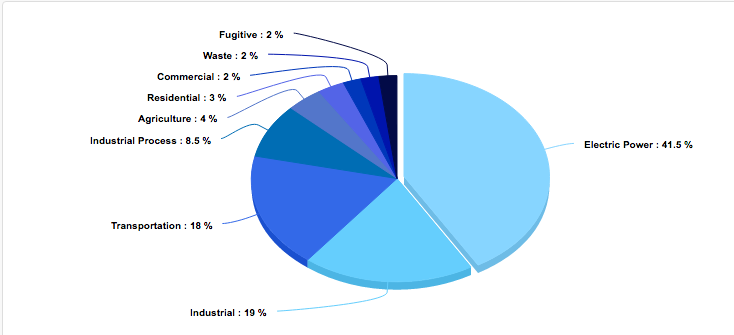This is why we can’t have “ice” things
May 2, 2017
It’s the year 2100. The world is hot. Not hot- scorching. Wildfires consume the earth. The average temperature has risen between 37 and 42 degrees fahrenheit. There is virtually no rainfall in some places, while others experience floods of biblical proportions. The water supply has suffered; glaciers are retreating fast. The ocean is so warm that many organisms have either died or been forced to migrate. The world is experiencing extreme coral and fish mortality. Mass extinctions are commonplace. And humans? We’re next.
THE FACTS
Climate change is a hotly debated topic across the globe, yet many Americans remain blissfully ignorant of the problem. However, if humans do nothing to stop climate change, a terrifying future awaits, much like the one described above, according to the website Global Weirding. Global Weirding is a visual demonstration of the damage climate change could cause to the earth if humans do nothing about the issue. The site was the result of a report created by the IPCC (Intergovernmental Panel on Climate Change).
According to a 2010 study conducted by Yale’s Program on Climate Communication, only about eight percent of Americans would achieve an “A” in regards to their knowledge of climate change, meaning that many are unaware of the devastation it could cause. So what are the facts?
Firstly, it’s important to note the differences between global warming and climate change. According to the National Aeronautics and Space Administration’s website, global warming is “the upward temperature trend across the entire Earth … due to the increase in fossil fuel emissions since the industrial revolution.” Climate change refers to multiple phenomena that encompass global warming as well as other trends like “sea levels [rising]; ice mass [losses] in Greenland, Antarctica, the Arctic and mountain glaciers worldwide; shift[ing] in flower/plant blooming; and extreme weather events.” So global warming is a facet and cause of climate change rather than a synonym for it.
Secondly, it is essential to recognize the factors behind both global warming and climate change. According to NHS Environmental Science teacher Alexandra Brownell, greenhouse gases are especially harmful.
“The primary cause of global climate change is human release of greenhouse gases, in particular carbon dioxide, sulfur dioxide and nitrous oxide,” Brownell said.
So the emission of greenhouse gases, combined with deforestation, mining, fertilizer use and other human activities, leads to global warming. Global warming in turn causes climate change.
“It’s all about the gases you put in the atmosphere,” Geology teacher Forrest Hurst said.
LOCAL IMPACT
Whether directly or indirectly, people all around the world are experiencing the consequences of climate change. Due to increases in the amount of factories, cars, fossil fuels and agriculture, the climate is changing. And scientists say it’s changing fast.
Climate change is also noticable in Indiana. Heavy rainfall and periodic flooding occur as temperatures rise because the air becomes warmer and more moisture evaporates into the atmosphere, thus leading to more rain and snowfall. This can lead to crop losses.
“[Climate change] can affect growing season,” Brownell said. “We are seeing earlier starts to spring and more humid summers.”
Overall, as the climate continues to shift, it continues to make the weather more unpredictable. This erratic weather makes farming more difficult.
“It can also affect water availability, which affects the productivity and type of crop to be grown,” Brownell said.
As climate change affects waterways, the consequences are predominant in Noblesville.
“[Climate change] could be affecting carbon dioxide solubility, or altering habitats for organisms [in the White River],” Brownell said.
Luckily, as technology continues to advance, the possibility of moving towards a solar or wind-based system begins to seem more possible.
“Ten years ago, I would say we couldn’t do much about [climate change] because we didn’t have the technology to switch from fossil based systems,” Hurst said. “Now it’s beginning to look like we’re coming into the place where we do have the technology to make changes.”
It’s not only technology that can make a difference. Junior Abbey Hackleman has changed her diet to help the planet. Along with the additional health benefits, Hackleman believes that becoming a vegan is the most effective way to help.
“I don’t believe the simple things make as much of an impact as cutting animal products,” Hackleman said. “People can make simple changes in their everyday routine to help the planet, such as taking shorter showers and car pooling.”
According to Hackleman, anyone can help by just being aware of the effects of their actions.
“Slowly switching out what foods you eat will help more than you think,” Hackleman said. “For example, you can easily switch out beef in your tacos for beans or switch to soy milk instead of dairy milk.”
However, not everyone is trying to stop climate change. Some politicians are standing in the way of environmental progress.
THE OPPOSING SIDE
Despite the extensive evidence and obvious changes in weather, many politicians continue to ignore what’s right in front of them. Indiana is currently one of only two states in the Midwest that does not have a long term plan to slow the effects of climate change.
Part of this opposition has to with the lack of understanding of the difference between weather and climate. Americans’ beliefs surrounding climate change are more heavily influenced by their local weather rather than global trends.
A big part of this problem, according to Hurst, is that people do not understand the scientific factors at work, and they choose to ignore the problem at hand.
“The systems are so complex,” Hurst said. “Some people just adopt the idea that if they don’t understand them, they say it’s not true.”
Another factor that plays into this “debate” is a big factor within most political arguments: money. Fossil fuel and energy companies are currently seeing record profits due to the amount of electricity that Americans use.
“A great deal of [non-believers] are probably tied to the fact that they don’t want to move from a fossil fuel economy,” Hurst said.
Companies that rely on fossil fuels rely on market share to make their revenue, and losing market share to renewable energy companies would derail their profits, so they try to prevent renewable energy from becoming a viable option, many industry analysts say.
Another significant factor, according to Hurst, is the lack of education among the older generations in the U.S.
“I forget that a lot of people, much older than me, have never had any education that had anything to do with biology, ecology, earth science,” Hurst said. “It’s a very new subject to them.”





